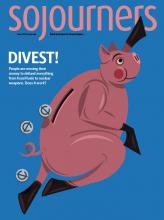THE SO-CALLED WAR on terror has dangerous and shifting financial front lines. Since the 9/11 attacks, a series of “anti-terrorism financing laws” have been enacted that allow the government to designate certain charities as “terrorist” organizations or as financing terror. The government can effectively shut down organizations without ever bringing criminal charges or providing evidence against them, according to the ACLU. “As a result,” it reported, “American Muslim organizations and individuals are unfairly targeted.”
In addition to fostering Islamophobia in the larger society and fear within Islamic and other faith communities, overzealous application of these laws can actually inhibit the war on terror. It risks crippling the very Islamic charities that can effectively combat radicalization in places vulnerable to extremists. Stephen Bubb, head of a charity network in Britain, where financial terror laws are similar to those in the U.S., has emphasized “sensible, credible, proportionate regulation” of Islamic charities. “I have witnessed firsthand the difficulties faced by organizations in Pakistan fighting the same battle that we are: for security, for a better way of life, and for a better future for our children,” said Bubb.
Read the Full Article
